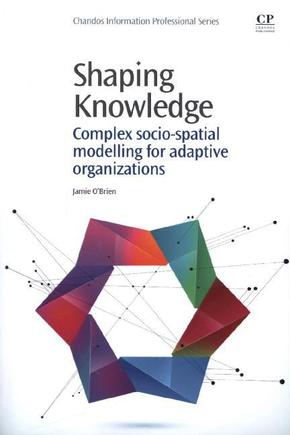Shaping Knowledge - Complex Socio-Spatial Modelling for Adaptive Organizations
| Verlag | Chandos |
| Auflage | 2014 |
| Seiten | 284 |
| Format | 15,6 x 23,5 x 0,7 cm |
| Gewicht | 406 g |
| Artikeltyp | Englisches Buch |
| Reihe | Chandos Information Professional Series |
| ISBN-10 | 1843347512 |
| EAN | 9781843347514 |
| Bestell-Nr | 84334751UA |
Organizations in ever-changing environments depend upon their knowledge, as their survival depends upon effective thinking and agile actions. Any organization's knowledge is its prime asset yet its true value requires the activations of structure, query, search and decision. Shaping Knowledge provides an introduction to the key tools for thinking required by decision-making professionals in today's knowledge-intensive landscapes, and equips them with key skills to capitalize on knowledge resources. This book provides practical methods and critical insights for modelling knowledge-driven domains, providing a rich resource for exploration in professional development and practice.
Inhaltsverzeichnis:
Dedication List of figures and tablesFigures Tables Acknowledgements Preface About the author 1: Introduction and case studyAbstract General introduction Space and knowledge Dimensions of knowledge Knowledge representation A case study in socio-spatial change Overview of the book 2: Innovation, agency and technologyAbstract Spatializing knowledge Space and innovation Knowledge as technology Knowledge as innovation Patterns of innovation Space, knowledge and power Conclusion 3: The dynamics of innovationAbstract The social life of innovation Regional dynamics Complexity and modularity Patterns of adoption Flows Waves Bifurcations Criticality Conclusion 4: Modelling knowledge dynamicsAbstract Information and knowledge Ecologies of innovation Ecologies of human development Network dynamics Network graphs Innovation networks The topology of regional knowledge System dynamics of innovations Conclusion 5: Modelling socio-spatial agentsAbstract Agency and action Manifolds and mes s Elements of agent behaviour Agency and autonomy Coalitions and decisions Resource allocation Search and decision-making Modelling with games Conclusion 6: Case studies in socio-spatial changeAbstract Micro-level socio-spatial change: slum sanitation Micro-level change agents Meso-level socio-spatial change: remote long-term care services Socio-spatial inclusion and mobile platforms Meso-level knowledge integration Exo-level socio-spatial change: Arctic urbanization Exo-level instability and infrastructure Agency and adaptation Dilemmas and homophily Bidding and voting Knowledge systems Conclusion 7: Reasoning with graphsAbstract Representing knowledge flow Visualization as science and art Visualizations as thought experiments Drawing relationships Logic, symbols and computing Computing for simulation Community models Spatial distance functions Complex data modelling Spatial data structures Surface-network analysis Conclusion 8: Decisions and argumentsAbstract Constructing kno wledge Decisions and representation Experience and arguments Basics of argumentation Argumentation schemes Deriving arguments Applying argumentation Conclusion 9: Directions for adaptive planningAbstract Principles of adaptation Adaptation in human systems Managing knowledge complexity Directions for planning Directions for research Planning with implicit knowledge Calibrating models General summary General conclusions Glossary Sources for socio-spatial argumentation Bibliography Index

